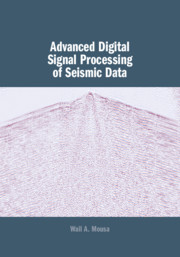Book contents
- Frontmatter
- Dedication
- Contents
- Preface
- Part I Seismic Theory Background
- Part II Deterministic Digital Signal Processing for Seismic Data
- 3 Spectral Analysis of Seismic Data and Useful Transforms
- 4 Sampling Theorem for Seismic Data
- 5 Seismic Applications of Digital Filtering Theory
- Part III Statistical Digital Signal Processing for Seismic Data
- References
- Index
4 - Sampling Theorem for Seismic Data
from Part II - Deterministic Digital Signal Processing for Seismic Data
Published online by Cambridge University Press: 24 December 2019
- Frontmatter
- Dedication
- Contents
- Preface
- Part I Seismic Theory Background
- Part II Deterministic Digital Signal Processing for Seismic Data
- 3 Spectral Analysis of Seismic Data and Useful Transforms
- 4 Sampling Theorem for Seismic Data
- 5 Seismic Applications of Digital Filtering Theory
- Part III Statistical Digital Signal Processing for Seismic Data
- References
- Index
Summary
This chapter presents sampling theorem for seismic data, including Shannon sampling theory for sampling continuous time (space) signals. Also, we explain the aliasing effects due to under-sampling of seismic data sets. Moreover, the theory of compressive sensing (CS) is currently considered the state-of-the-art theory of DSP, with many applications related to signal and image compression, signal recovery, and many other applications. CS is currently used for various seismic data processing problems. Hence, in this chapter we introduce CS principles and provide a few seismic data processing-related applications.
Information
- Type
- Chapter
- Information
- Advanced Digital Signal Processing of Seismic Data , pp. 193 - 220Publisher: Cambridge University PressPrint publication year: 2020
